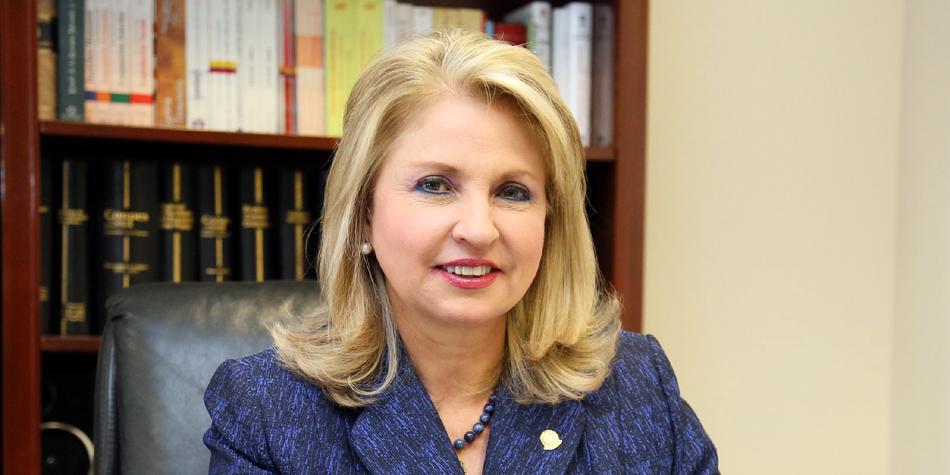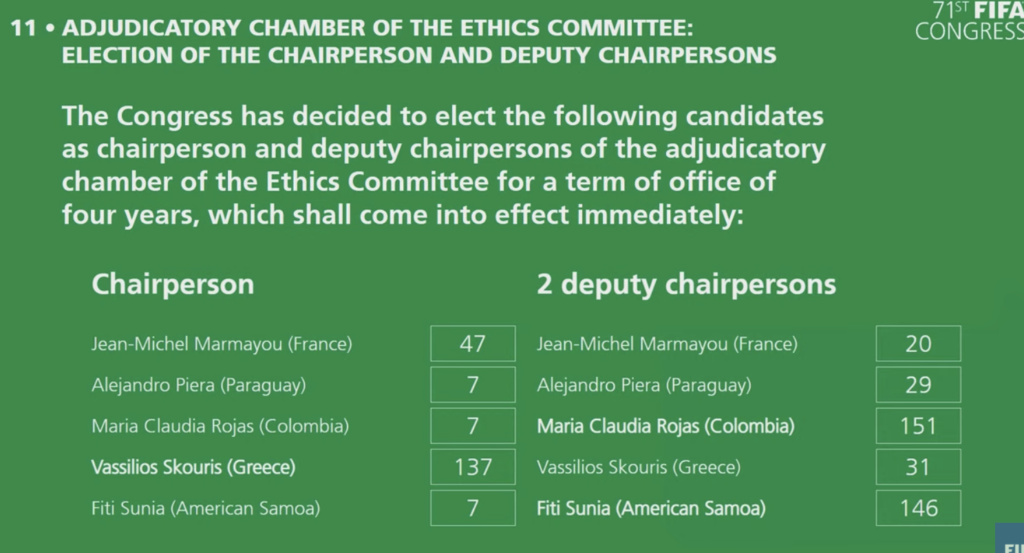By Paul Nicholson
May 21 – Whatever credibility or trust that might have been lingering in FIFA’s Ethics apparatus was pretty much shattered at the world governing body’s congress today with the election of Maria Claudia Rojas (pictured), former chair of the investigatory chamber, to the deputy chair of its adjudicatory chamber.
Rojas, who was also standing to keep her old investigatory role (she didn’t get the votes), received 151 votes for the deputy chair’s role in the adjudicatory chamber, effectively creating the possibility that she will end up judging the cases she opened as an investigator (she would have to abstain for a year from presided over a case opened under jurisdiction).
The conflicts of interest and the likelihood of prejudice in the judging of cases are obvious. In civil society – and certainly in Switzerland – a switch between the two functions with the judiciary would not be allowed. Indeed, it is such a no-go area that it would not even be considered.
Even if Rojas were kept off judging her own cases, her knowledge of her former department and potential to influence investigations is dangerously uncomfortable for an independent and fair judicial process.
Greek Vassilios Skouris was re-elected chair of the adjudicatory chamber and Fiti Sunia from American Samoa retained his deputy chair position.
In the Investigatory Chamber Rwanda’s Martin Ngoga takes over as chair while Canada’s Bruno de Vita retains his deputy chair slot. He is joined by Malaysia’s Parasuraman Subramanian as a deputy chair.
Even the most ardent supporters of the FIFA line that its Ethics investigatory and judicial chambers are independent will have difficulty defending the integrity of an Ethics function that has been increasingly criticised as a weaponised division working to the political will of its executive.
That the Rojas switch over was made so seamlessly and without comment shows the vice-like grip FIFA president Gianni Infantino has over his federation membership.
While federations could perhaps not be blamed for missing the obvious conflicts in the appointment, being asleep at the wheel could see a good number of them heading for a nasty crash if they dared to exercise any free thinking that didn’t align with FIFA executive thinking.
FIFA’s executive has increasingly been criticised as using its Ethics process as a blunt tool to control its membership. Examples of member association presidents being threatened with Ethics investigations and judgements that could be made to disappear if they followed the FIFA executive line have multiplied – but it is that rule of fear that has kept a much vaunted ‘unity’.
Rojas has already demonstrated herself a loyal footsoldier having ruled (as chair of the investigatory chamber) that there were no grounds to suspend or investigate Infantino in light of his own criminal investigation into interfering with Swiss judicial procedures regarding his secret meetings with former Swiss Attorney General Michael Lauber.
There is an irony here in that the Swiss criminal investigation centres around accusations of Infantino attempting to interfere with the national judicial process. It seems to be a recurring pattern of behaviour in FIFA as it transitions towards Infantino’s 3.0 vision.
Contact the writer of this story at moc.l1714091778labto1714091778ofdlr1714091778owedi1714091778sni@n1714091778osloh1714091778cin.l1714091778uap1714091778


